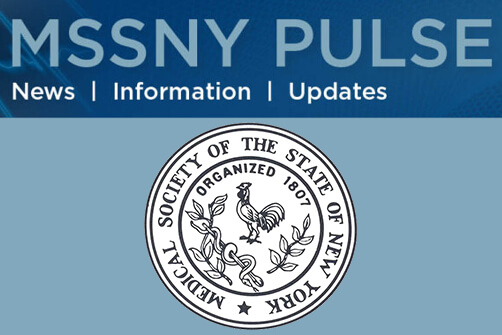
MSSNY Urges Legislature to Address “Burnout” Drivers and Reject Scope Expansion that Adversely Impacts Patient Care
This week MSSNY President Dr. Paul Pipia was one of many healthcare association representatives that testified at a NYS Assembly hearing examining the state of New York’s workforce and efforts to address various health care professional worker shortages.
Dr. Pipia’s testimony focused on the importance of addressing the adverse impact to our healthcare system arising from the increasing prevalence of “burnout” suffered by physicians and other health professionals. To help respond to this problem, he called for legislation to enhance confidentiality protections for MSSNY’s peer support program to further encourage physician use of this important program. He also highlighted the need to reduce the litany of administrative hassles accelerating physician burnout, including excessive documentation and authorization demands from health insurers, and excessive reporting requirements for Medicare.
He also highlighted a number of steps that could be taken to address physician shortages, including increasing the current residency cap, increasing funding for medical student loan repayment programs, and increasing practice opportunities for International Medical Graduates (IMGs). He also highlighted the need for legislation to bring down New York’s exorbitant liability costs, which is a major deterrent to physicians considering relocating to or staying in New York to practice.
Given the significant number of witnesses calling for scope of practice expansion to address worker shortages, he forcefully expressed that replacing physician care with non-physician care is NOT the answer to ensuring proper patient care. He expressed great appreciation for the critical role placed by advanced care practitioners in helping to meet our care delivery demands, but emphasized the importance of maintaining supervision and collaboration, noting surveys on patient sentiment that show that 95% of patients believe it is important that a physician be involved with their diagnosis and treatment decisions, and various studies detailing the increased health care costs as a result of unsupervised care provided by non-physicians.
During the Q&A portion, Dr. Pipia also answered numerous questions regarding proposals with which MSSNY has expressed concerns previously. This includes legislation to permit New York to join the Interstate Medical Licensure Compact, and legislation that would permit Physician Assistants to practice without defined physician supervision after 8,000 hours of practice.
Share
Change Healthcare by Changing Change Healthcare Colleagues: New York City-based NYC Health + Hospitals has made the switch from Change Healthcare to Experian because of the cyberattack on the claims processing vendor. Change turned many of its IT systems offline following the Feb. 21 hack, and that left many hospitals and physician practices unable to […]
Federal Investigation into Private Equity, Consolidation in Medicine Three federal agencies are investigating the impact of private equity ownership and the broader consolidation of healthcare organizations on patient care and costs, prompting a wave of concern among physicians. According to Rhonda Wright, MD, from Brookhaven, Georgia, the influence of private equity has led to deteriorating […]
MSSNY’s Peer to Peer (P2P) Program Available to Help Stress and burnout among physicians have been documented for years, and can be overwhelming at times. MSSNY’s peer supporters can help you gain a new perspective on your job and other life stressors. MSSNY’s Peer to Peer (P2P) program affords physicians, residents, and medical students the […]
Baby Born Deaf Can Hear After Breakthrough Gene Therapy In a landmark advancement in gene therapy, Opal Sandy from Oxfordshire has shown remarkable progress in the global CHORD (Children Hearing and Oral Restoration through DNA) trial, significantly advancing the treatment of auditory neuropathy. This condition disrupts nerve impulses from the inner ear to the brain, […]



